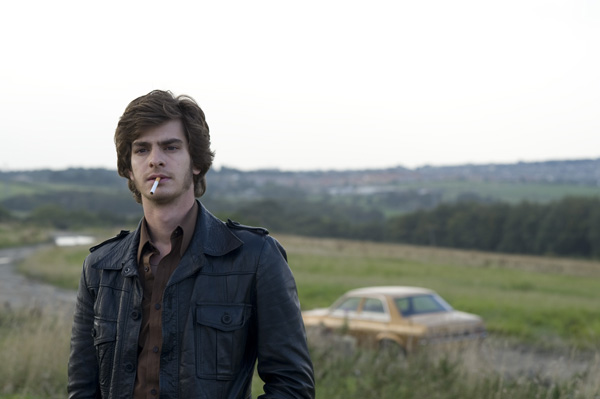|
Reviews of Recent Independent, Foreign, & Documentary Films in Theaters and DVD/Home Video

THE RED
RIDING TRILOGY
RED
RIDING: 1974
RED
RIDING: 1980
RED RIDING: 1983 The Red Riding Trilogy is a feast for fans of gritty British mysteries. Through three linked, profanity- and violence-filled films, a gallery of vivid characters sinks deeper into a quicksand of guilt and brutality across a dark decade of killers and corruption. The trilogy crosses bloody good crime movies with socially conscious police procedurals because here the cops are the gangsters. While the real Yorkshire Ripper and child abduction serial murders in the north of England have fed other fiction and documentaries, David Pease’s quartet of novels is a tour de force of first person perspectives from almost every damaged character over a decade of brutal crimes and worse cover-ups. (Amid many, almost impenetrable Britishisms, a “riding” is like a county.) The bravura of a toast to “This is the North, where we do what we want” proves true, dragging everyone, even the most sympathetic, down into a choking cesspool. Like a repertory company, the large ensemble of talented character actors appear and reappear throughout, sometimes in flashbacks, with primary roles in one and secondary roles in others. The emotional wallop of using a crime story to examine the human collateral damage during the Thatcher years resonates like David Simon’s institutional attacks in The Wire, crossed with the brazen police violence of Shawn Ryan’s The Shield. The trilogy was first broadcast in the U.K. as a TV mini-series, and is being shown in theaters in the States in “road show” marathon screenings. 1974 is by far the best, and it will so grip your guts that you’ll want to watch the rest of the series, not just for story line resolutions but out of a sense of outrage and morbid curiosity to find out if the (fairly) good guys can ever be revenged. Andrew Garfield fulfills the promise of his performance in Boy A, playing ambitious cub crime reporter Eddie Dunford, who gets in over his head in every possible way, including his involvement with a source—the abused, bereft mother Paula Garland (Rebecca Hall, transformed downscale from Vicky Cristina Barcelona). His anguish haunts every moment of the trilogy. Sean Bean has been playing creepy Hollywood villains for awhile now, but his real-estate tycoon John Dawson is as charismatic as he is repellant, and not just for his obsession with beautiful swans. Warren Clarke (as “Badger Bill”) and David Morrissey (as “The Owl”) have played stolid bureaucrats before, so it’s that much more fascinating to watch them gradually fray under the pressure of the mounting death toll and conspiracies. Peter Mullan and Eddie Marsan only need to be on screen briefly to make their over-confident reverend and reporter, respectively, add to our uneasiness. Director Julian Jarrold started out with ground-breaking TV cop shows like Cracker before switching to flirtatious costume dramas like Becoming Jane, and he makes the most of the very dark cinematography of Rob Hardy (also of Boy A). 1980 is the weakest, depicting the most straightforward war on crime as directed by James Marsh, showing little of his flair from Man on Wire. With the inevitable pruning and telescoping from cutting the quartet of linguistically acrobatic novels down to a trilogy (the missing fourth covers an anguished 1977 inside the heads of coppers drowning in the dirt), some of the clues begin to seem too obvious to be rediscovered by Paddy Considine’s seemingly squeaky clean investigator Peter Hunter. But how the buttoned-down outsider is turned inside out keeps the audience hooked, if stunned, as the clues escape solution. The 1983
conclusion, directed by Anand Tucker, revisits the gruesome murders of
part one through a reluctant anti-hero. The beaten down audience is
revived by this new character, the chubby, ineffectual lawyer John
Piggott (Mark Addy, one of the woebegone crew in The
Full Monty). There are stomach-turning twists as Piggott fights a
miscarriage of justice. Because of his family ties, he struggles against
the past, as well as the powers that be. Don’t expect all the
loose ends to be tied up neatly in the north of England. No vampires or
demons, just the ever human banality of evil.
Nora Lee Mandel
|

